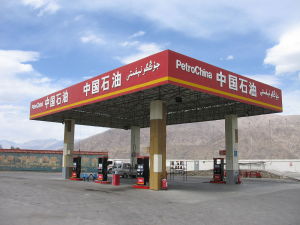China Vows to Ban Extralegal Activities, but Enforcement Problems Remain
 The Communist Party of China (CPC) on October 28 released a list of set government powers meant to ban any extralegal activities by administrative authorities, which comprises of measures that “squeeze out” any space for actors to potentially use government power to influence regulations and business advantages. The document also pledges to slash administrative redundancies and strengthen enforcement regarding public health regulations and government spending. This document comes as part of the advancement of the rule of law mandate agreed upon at the fourth plenary session of the 18th CPC Central Committee. It seems fairly straightforward, therefore, that the CPC hopes to put further pressure on administrative officials to stop bending the law for personal gains.
The Communist Party of China (CPC) on October 28 released a list of set government powers meant to ban any extralegal activities by administrative authorities, which comprises of measures that “squeeze out” any space for actors to potentially use government power to influence regulations and business advantages. The document also pledges to slash administrative redundancies and strengthen enforcement regarding public health regulations and government spending. This document comes as part of the advancement of the rule of law mandate agreed upon at the fourth plenary session of the 18th CPC Central Committee. It seems fairly straightforward, therefore, that the CPC hopes to put further pressure on administrative officials to stop bending the law for personal gains.
This initiative marks the latest step in President Xi Jinping’s much-touted campaign to stamp out corruption and power abuse within the Party. Xi’s anti-corruption campaign already has several major casualties. Song Lin, accused of serious violations in law and discipline by the central government’s discipline committee, was removed as chairman of China Resources, one of the largest investment-holding SOEs. He is not the only casualty of the anti-corruption campaign. Jiang Jiemin, former chair of oil giant PetroChina, “was found guilty of taking advantage of his post to seek benefits for others and extorting and receiving a huge amount in bribes.” These high profile arrests demonstrate the seriousness of President Xi’s anti-corruption policies.
Yet even with these recent string of high-profile arrests, corruption continues to plague China. Just recently, a record amount of money, 200 million yuan ($33 million), was confirmed to be raided from a top official’s home. The official, senior energy official Wei Pengyuan, is currently under investigation for corruption charges. Though the recent ban on extralegal activity is meant to provide Xi with a mandate to eradicate extravagant behavior, it is doubtful whether the ban can be successfully enforced, considering how endemic corruption is in Chinese society today.
There are several practical barriers preventing full implementation. For one, the number of government officials, from the highest positions to mere heads of villages, is far too large for anyone to efficiently ensure that the list of government powers is not abused. China has one of the largest bureaucracies in the world - as of 2012, there were approximately 10 million public servants in the Chinese government, and that number has undoubtedly risen since. Moreover, many of these employees may not even exist. Last month, President Xi directed efforts to remove more than 160,000 phantom employees from the pay rolls in an effort to cut down on government expenditure. The massive and complex bureaucracy in China will mean it will be near impossible to effectively implement these new rules and regulations, short of a herculean effort.
On surface, there are at least two obvious motivations for the CPC’s sudden emphasis on the “rule of law” this year. First, the Party has realized that cracking down on corruption is an efficient method of increasing government revenue. But while that is undoubtedly useful, Xi is probably more concerned with attempting to improve the legitimacy of the current government. During the massive Hong Kong protests last month, many of Hong Kong’s leaders (who are close to the CPC) repeatedly pleaded for the protestors to adhere to the “rule of law”, which is essentially codeword for listening to the CPC. It is certainly possible that in the long run, China’s newfound enthusiasm for the “rule of law”, a concept long espoused by the international community, may eventually set it on the path to democracy. But for now at least, it appears to be merely a tactic for the CPC to solidify its rule in China, and lip service at best.
Beyond those two motivations, many outside observers have accused President Xi of using the anti-corruption campaign to root out his political opponents, by providing a useful cover for the Party to publicly shame such targets and remove them from power. While the targets may well be corrupt (and they usually are), insiders know that the real reason for their downfall is because they have incurred President Xi’s wrath. In other words, the deterrent effect against corruption is limited, because what officials will really be concerned about is lying low and flying under the Party’s radar, rather than limiting their profligate ways per se. It is therefore doubtful that the ban will be all that effective in enhancing the rule of law, especially if it continues to be used arbitrarily for political purposes.
In any case, however, the fact that this document was published by the CPC at its fourth plenary meeting gives it some semblance of legitimacy. Optimists may still hope that this document will actually be used to stamp out corruption and enforce the rule of law. Nevertheless, the initiative is yet another sign of how the issue of corruption and rule of law may threaten the stability of the CPC’s regime in China. China must muster the requisite political willpower to deal with this problem if it desires to truly rise as a developed nation, for both economic and reputational reasons.
